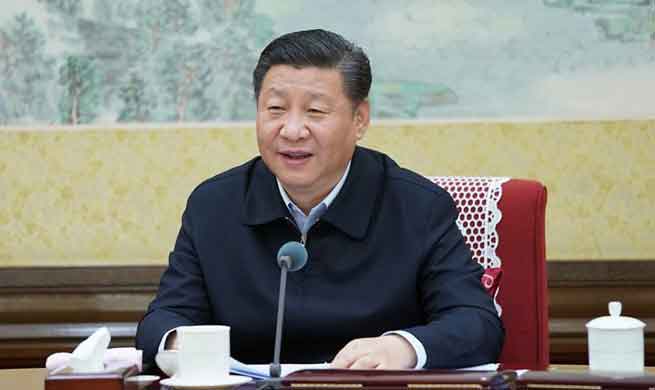by Zheng Jianghua
BRUSSELS, Dec. 27 (Xinhua) -- The year 2017 has seen a sequence of elections across Europe, in most of which populist parties were outgunned. Still, the results fired a warning shot across the mainstream parties' bows, begging the question of whether they will stage a comeback in the future elections.
For the time being, there is no easy answer to that question. But what the outgoing year's elections signaled hardly boded well for Europe's established parties.
NETHERLANDS: PVV LOST GROUND?
Deemed as the opening chapter of Europe's election year, the Dutch legislative election in March was thrust into the spotlight, amid concerns that the far-right populist Freedom Party (PVV) headed by Geert Wilders would chalk up a victory.
In a country traditionally subscribing to the value of diversity, the anti-immigration, eurosceptic PVV won 20 seats in the 150-seat lower house of parliament, carving out a niche as the second largest party, only after Prime Minister Mark Rutte's liberal People's Party for Freedom and Democracy (VVD), which won 33 seats.
All other parties refused to govern with the PVV, and after a record-breaking 209-day talks, VVD struck a coalition deal on Oct. 9 with three other parties. The new cabinet was officially sworn in on Oct 26.
A salient fact is that the coalition deal took a tougher line on migration, which in no small measures bore the hallmarks of the PVV, aiming to offset the appeal of the latter.
Joris Larik, senior researcher at The Hague Institute for Global Justice, summed up the Dutch government's plan on migration as "those who can stay have to participate fast" and "those who cannot stay have to leave fast."
In this context, though the PVV was kept from the new government, it by no means lost ground.
FRANCE: FN'S ELECTORAL BASE MAKES PROGRESS
In France, Marine Le Pen, head of the far-right National Front (FN), was outplayed in the May presidential run-off by Emmanuel Macron, a political novice who led The Republic on the Move Party (LREM).
If anything, the result -- 66.1 percent to 33.9 percent -- was attributed to a tacit understanding among those who were against Marine Le Pen.
Be that as it may, it merits serious attention that Le Pen, way ahead of other candidates, snapped at the heels of Macron in the first round presidential election in April.
In the ensuing parliamentary elections in June, Le Pen's FN secured 8 seats, a leap from 2 in the last elections in 2012.
Luc Rouban, a researcher with the Center of Political Research of Science Po (CEVIPOF) said the FN was an extremely powerful opposition pole, whose electoral base had made significant progress in the past three presidential elections.
"It is true that Le Pen was criticized within the party after her defeat, but we must not forget that she had ten million votes," he said.
GERMANY: FAR-RIGHT PARTY ENTERS BUNDESTAG
In Germany, the far-right Alternative for Germany (AfD) party racked up 12.6 percent of votes in the federal election in September, becoming the third largest party in the Bundestag, or the Federal Parliament, in only four years since its inception.
It was the first time a far-right party had entered the Bundestag after the Second World War.
Like what happened in the Netherlands, Germany's established parties have no intention of teaming up with the AfD.
However, Chancellor Angela Merkel's effort to form a "Jamaica coalition" fizzled out in late November after a time-consuming negotiation, as the mission to bridge the yawning gap between the Liberals and the Greens proved to be a tall order.
The ensuing negotiation with the Social Democrats (SPD) was anything but a low-hanging fruit, as SPD, led by former president of European Parliament Martin Shultz, seemed to be fed up with playing second fiddle in Merkel's government.
It remains to be seen whether Merkel could cut a deal with SPD, and if she could, with what strings attached. But it's widely believed that the AfD is on course to garner more votes if Merkel fancies a new election.
AUSTRIA: FAR-RIGHT FPO IN COALITION GOV'T
In Austria, a new coalition government, consisting of the conservative People's Party (OVP) and the far-right Freedom Party (FPO), was sworn in on Dec. 18, following protracted negotiations after the Oct. 15 election.
OVP won the election with 31.5 percent of the poll, while FPO ranked third scooping 26.0 percent of the ballot.
The incumbent Chancellor Christian Kern's center-left Social Democratic Party of Austria (SPO), secured 26.9 percent of the votes, ranking second.
The new chancellor is 31-year-old Sebastian Kurtz, the head of OVP and Europe's youngest leader. FPO leader Heinz-Christian Strache took up the post of vice-chancellor.
At a joint press conference presenting programs in their upcoming five-year term on Oct. 16, Strache said the two parties have very good chemistry and share common ground on about 75 percent of their governing program.
The two leaders saw eye to eye on tougher refugee policies, including quicker processing of asylum application and faster deportations of illegal migrants. They also spoke out against the current refugee quotas in European states.
Former Austrian vice-chancellor Erhard Busek told Xinhua that the result of Austrian election showed a general political movement to the right, even including the center-left or the conservative parties.
Busek's comments also hold true regarding Europe's other elections. Then a question ensues: if political parties of all stripes have the "right" attributes, then what matters when it comes to wooing voters?
Observers have pointed out that traditional left-right divide in western politics is on the wane, giving way to identity-based politics, which places emphasis on race, community, and globalization.
If the trend continues -- quite likely it does -- the established parties will once again feel the populists breathing down their necks in Europe's next poll year. The Italian parliamentary election, slated for March 2018, is just the starter.

















